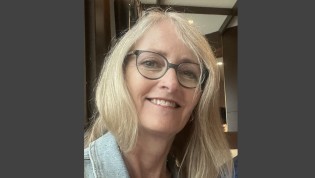Feeling like you’re faking it—even with solid bylines and clients? You’re not alone.
In September 2025, the Canadian Freelance Guild hosted a webinar on Imposter Syndrome and How to Beat It featuring expert panelists John Geary, Vanessa Chiasson, and Kaarina Stiff. A summary of this discussion is below. To view the webinar, you can access it here.
Freelancers, doubt and doing it anyway
Every freelancer has met the voice. The one that shows up right after you land a great client or finish a project you’re proud of. It leans in and whispers, “Who do you think you are?”
It’s such a universal experience that the Canadian Freelancers Guild recently devoted an entire panel to it. Moderator Vanessa Chiasson—a travel writer from Ottawa with a sense of humour as sharp as her pen—was joined by veteran journalist-photographer John Geary and communications consultant and writer Kaarina Stiff. Together, they unpacked how imposter syndrome sneaks into self-employed life and how to stop it from running the show.
What followed wasn’t a tidy lecture. It was a conversation that sounded like the world’s most relatable group therapy session: honest, funny, occasionally salty, and very, very familiar.
The doubt that never really leaves
John didn’t hesitate. “I think it’s always lurking,” he said. “You get over it, and then it’s just waiting in the background for an opportunity to sabotage you.” That line landed like a collective sigh of recognition. Because he’s right—imposter syndrome doesn’t vanish after you win an award or sign a new contract.
Kaarina remembered a time when she didn’t feel it at all—“because I was really young and had no idea how the world worked.” Now, she says, “We let voices take up space in our heads without paying rent. The older we get, the more voices there are.” For freelancers, those voices echo louder. There’s no colleague down the hall to confirm that you’re on the right track. That’s part of what makes peer networks like the CFG invaluable: it’s a place to swap stories, share wins, and remind each other that this feeling isn’t proof you’re failing. It’s proof you’re pushing yourself.
When the goalposts move
Confidence, it turns out, isn’t a finish line. It’s a moving target that shifts every time the industry does.
John laughed about how quickly trends reshape expectations. “It shifts from publication to publication, from editor to editor. You’d write differently for BuzzFeed than for Canadian Wildlife, even if it’s the same topic.” And it’s not just writers. Designers chase new aesthetics, photographers navigate shifting algorithms, consultants watch their once-fresh strategies turn outdated overnight. The freelance marketplace rewards adaptability—but constant evolution can also feed the sense that you’re never quite “there.”
Vanessa summed it up neatly: “The benchmarks for success keep changing.” One decade’s best work can feel dated the next, even when the skill behind it hasn’t changed a bit.
So what’s the fix? Keep evolving—but refuse to treat yesterday’s wins like expired milk. They still count.
The cost of playing small
At one point, Vanessa asked the audience a brutal question: Has imposter syndrome ever stopped you from doing something? Every single participant said yes.
Kaarina nodded. “There were jobs I didn’t apply for, roles I didn’t pitch myself for… I’d look at the qualifications and think, “I don’t have enough experience for that.” John had a story of his own. Early in his career, he applied for a job as a newspaper editor. It was a stretch. The paper hired someone else for that position, but called him anyway. “They liked my résumé so much they created a whole new job for me,” he said. “Their first full-time sports reporter.” He shrugged. “If you’re good enough to get published, you’re good enough to apply.”
The useful kind of doubt
Vanessa pushed the conversation further: could imposter syndrome ever be helpful?
Kaarina was quick to separate healthy reflection from toxic self-doubt. “As soon as I want to call something imposter syndrome in my head, it’s bad,” she said. “But asking, ‘Is this story mine to tell?’—that’s good judgment.” John agreed. Sometimes hesitation isn’t insecurity; it’s professionalism. The trick is learning to tell them apart. “You can fine-tune something forever,” he said, “but there’s a difference between imposter syndrome and just knowing it’s not ready yet.”
For freelancers, that distinction matters. Doubt can sharpen your work—but only if it pushes you to improve, not to disappear.
Freelance fixes that actually work
Theory aside, the panel delivered a handful of strategies worth taping to your monitor.
Build your own proof file. John keeps every compliment, testimonial, and positive email from editors and clients in a single folder. On rough days, he reads them. “They don’t give awards or kind words to people who don’t deserve them,” he reminded everyone.
Make a “win jar.” Kaarina’s version is a digital sticky note where she records every success, from landing a client to nailing a tricky project. “On a down day, you reach in and pull one out,” she said. “It’s proof you’re not making this up—you really are good at what you do.”
Watch your words. Vanessa flagged a subtle confidence killer: language. How often do freelancers write, “I just wanted to check in” or “Sorry to bother you”? Those small phrases teach others—and ourselves—that we don’t deserve the space we occupy. Replace them with direct, professional language. Clarity isn’t aggression; it’s confidence in action.
Lean on your people. Freelancing can feel like flying solo, but no one succeeds entirely alone. Whether it’s a Freelance Friday meetup, a trusted peer group, or a few freelancer friends in your corner, having a “water cooler” matters. Sometimes hearing someone else admit they feel like a fraud is all the reminder you need that you’re not one.
Doing it anyway
By the end, Vanessa asked each panellist for a closing thought. Kaarina’s answer came out like a mission statement: “Do it anyway.” Apply for the grant. Pitch the dream client. Submit the portfolio. Do it because the worst-case scenario—someone says no—is survivable. The best-case scenario changes your career.
John added the simplest truth of all: “Everybody gets it. I’d be shocked to meet a freelancer who’s never felt this.” So the next time imposter syndrome leans in to question your credibility, take a deep breath, open your inbox, and send the thing anyway. You’re not faking it—you’re freelancing. And that’s harder, braver, and more real than the imposter could ever understand.
Search
Recent Posts






